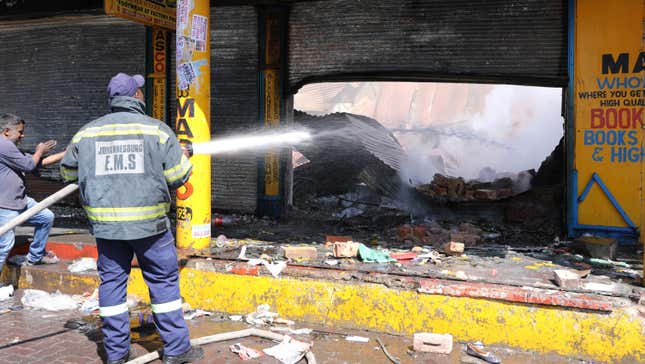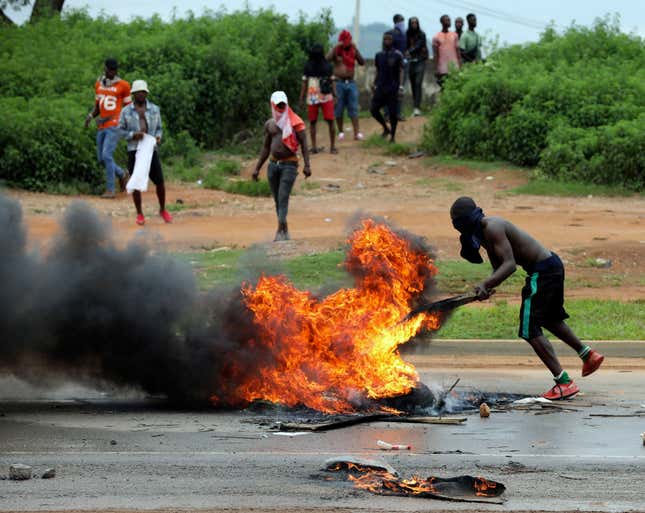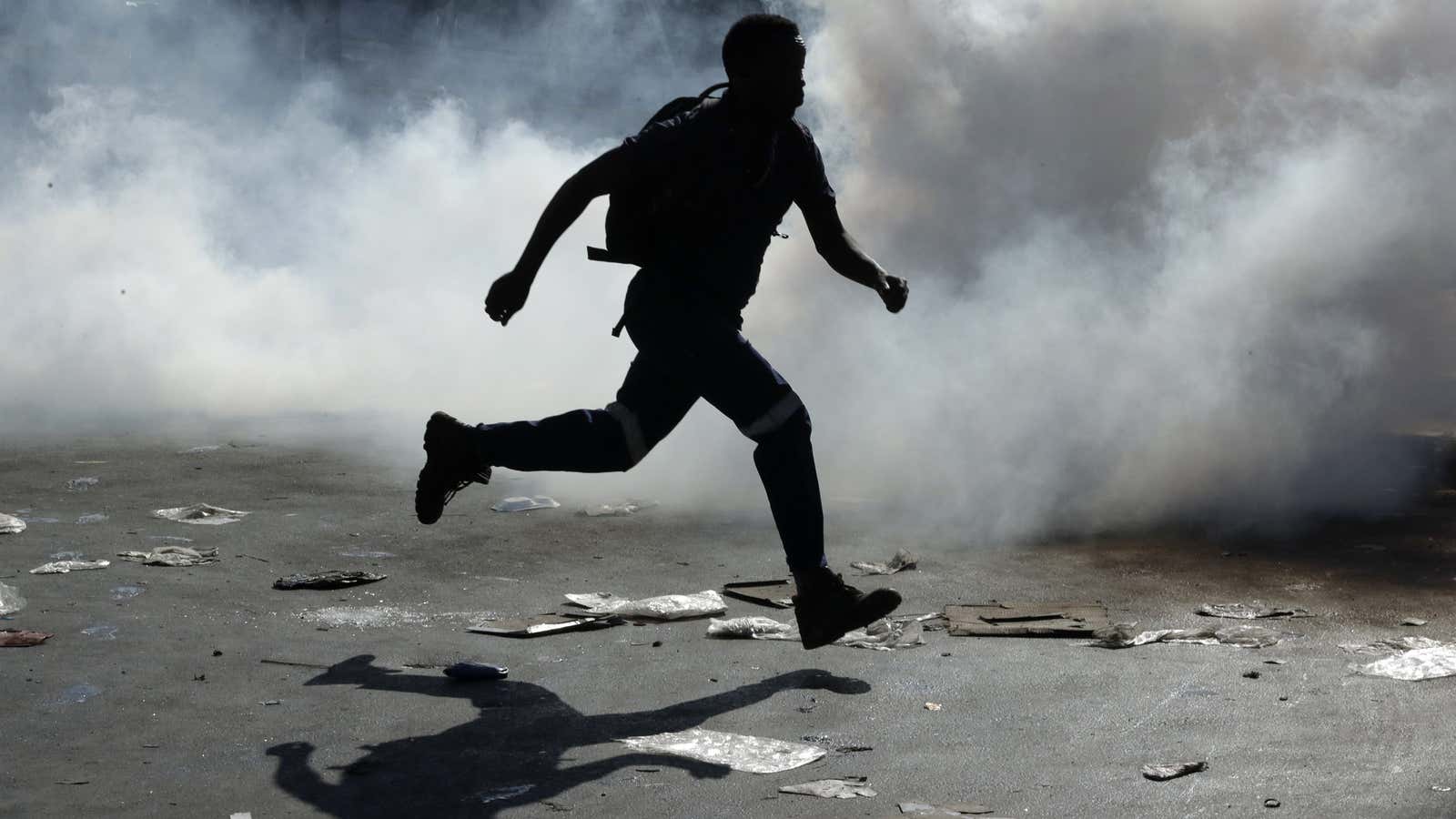Nigeria’s government is responding to reported xenophobic attacks on its citizens in South Africa by boycotting the ongoing World Economic Forum (WEF) in Cape Town, South Africa and will reportedly recall its ambassador to South Africa.
Nigeria’s foreign minister also invited the South African high commissioner to Nigeria “to protest the unacceptable burning and looting of properties belonging to Nigerians” and make “concrete proposals” for compensation of Nigerians affected.
Reports of the attacks in South Africa first emerged on Monday with news of looting and destruction of dozens of shops owned by foreigners, including Nigerians. Looters in Johannesburg’s Central Business District “targeted” shops believed to be owned by foreigners, local South African media reported. The attacks continued on Tuesday leaving five dead. Local police said the dead were mostly South Africans.
The graphic images of these latest xenophobic attacks—both real and fake—have had an impact that’s now reverberating across the continent, resulting in reprisals.

In Nigeria, several outlets of South-Africa owned businesses including retailer Shoprite and telecoms operator MTN have been targeted around the country. In one incident in Lekki, an upmarket Lagos neighborhood, a clash between police and protesters at a mall housing a Shoprite outlet left one person dead. The protesters were also said to be screening cars and stores in search of foreign nationals to attack.
Outlets of MTN, Nigeria’s largest telecoms operator, were attacked in three Nigerian states, including its capital. In response, the telecoms operator notified subscribers today (Sep. 4) that its physical outlets are currently “unavailable.”
In response to the attacks, Zambia has also cancelled a friendly football match with South Africa due to take place in Lusaka on Saturday. Local reports of Zambians attacking outlets of South-Africa owned businesses have also emerged.

The role of fake news
Graphic videos and photos purported to be recent have been a key element driving the waves of reprisal attacks and rhetoric. Nigerians have been sharing videos on WhatsApp of burning bodies claimed to be the bodies of Nigerians in South Africa attacked in recent days. However, as fact checks have already shown, several videos and images that have gone viral “are unrelated to the recent outbreak.“
In one instance, popular Nigerian blogger Linda Ikeji, who’s known for sharing unverified news and reports, published photos of a burning MTN outlet from a 2015 incident and claimed they were recent.
Nigeria’s consulate in Johannesburg also denounced a report from South African broadcaster eNCA claiming that riots in Pretoria were caused by the killing of a local taxi driver by a Nigerian. The consulate described the report as an example of the “malicious stereotyping of Nigerians which have led to many negative consequences.”
For its part, WEF officials has also been forced to deny several reports which claimed that president Paul Kagame of Rwanda (and his counterparts from Malawi and the Democratic Republic of Congo) boycotted its Cape Town event in protest of recent attacks. WEF says Kagame canceled his participation last week before the latest round of xenophobic attacks broke out.
Masked anger
While attacks in both nations are couched in xenophobic rhetoric, in reality they are driven more by stoked economic tensions and growing inequality. They also point at signs of impending collapses and class wars between the poor and the rich fueled by failures of leadership in both countries as several parallels show.
Due to government inability to engineer sustained economic growth through policy, both of Africa’s largest economies are plagued by rampant and high unemployment—particularly among fast-growing youth populations, resulting in poverty. In Nigeria’s case, it’s now home to the world’s largest population of poor people. Even worse, low human capital spending suggests the country will make very little progress in the immediate future to reverse those fortunes.
Nigeria and South Africa saw their economies suffer recession in 2017 and have not made significant comebacks since.
Political leaders in both countries are also unpopular and mistrusted despite winning recent elections: Nigeria’s president Muhammadu Buhari has not delivered on key campaign promises of fighting insecurity and fixing the economy while South Africa’s Cyril Ramaphosa and his ANC party have proven unable to deliver a turnaround as promised following Jacob Zuma’s ouster from office.
As it turns out, both presidents have also been widely criticized for their handling of recent attacks. Shenilla Mohamed, Amnesty International’s executive director for South Africa says local authorities are complicit in the attacks on foreign nationals who have “served as convenient scapegoats for unscrupulous politicians” who push xenophobic narratives. Ramaphosa faced criticism in March for stoking anti-foreigner sentiments during a campaign rally
For his part, president Buhari has been criticized for a tepid response to the attacks with Nigerians sharing their criticisms online with the hashtag #WeNoGetPresident, a slang in local parlance which translates to “we don’t have a president.”
Sign up to the Quartz Africa Weekly Brief here for news and analysis on African business, tech and innovation in your inbox
